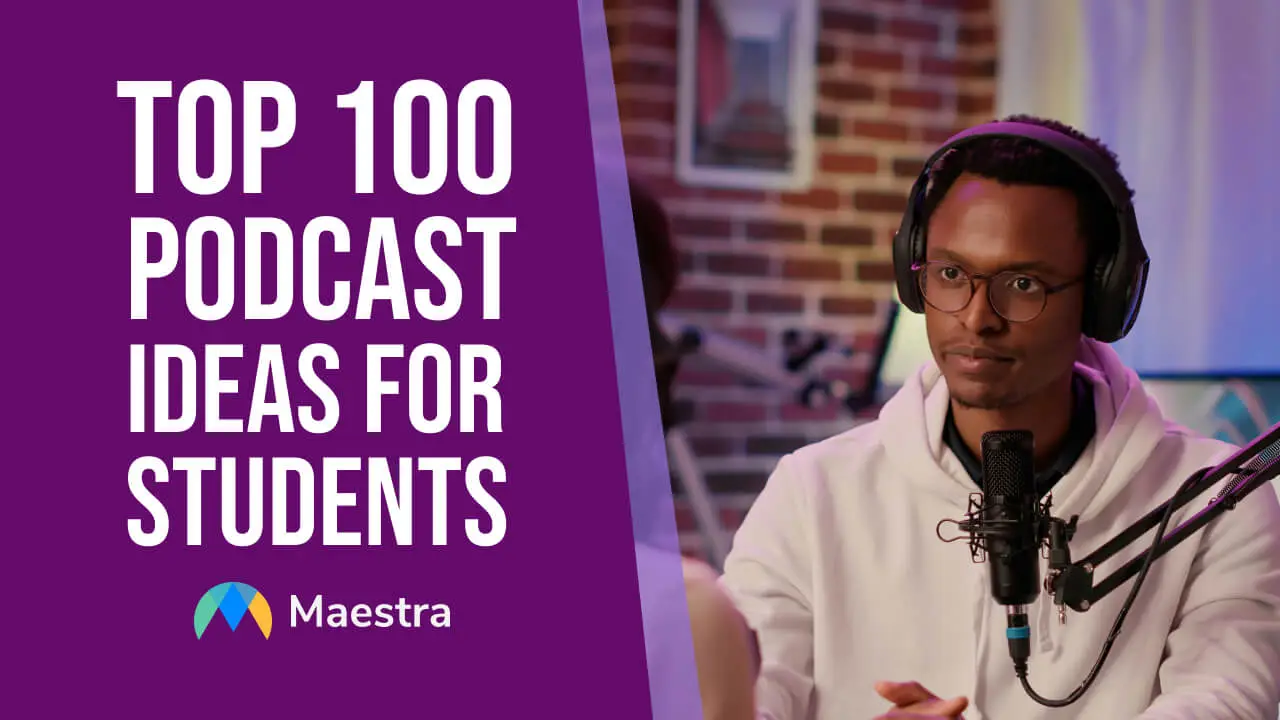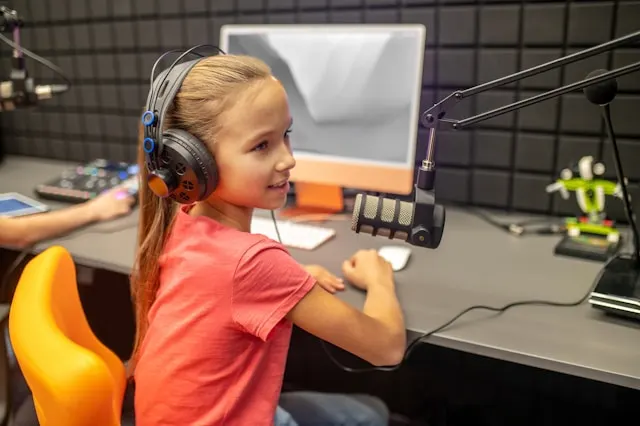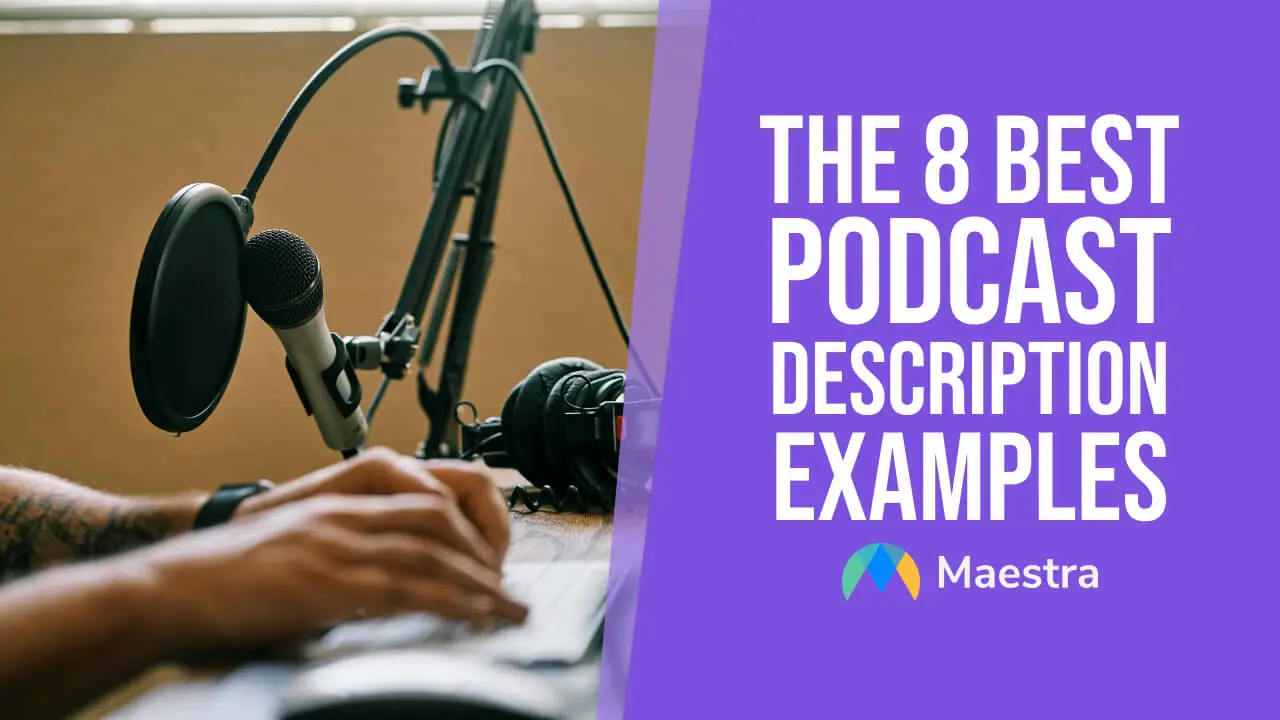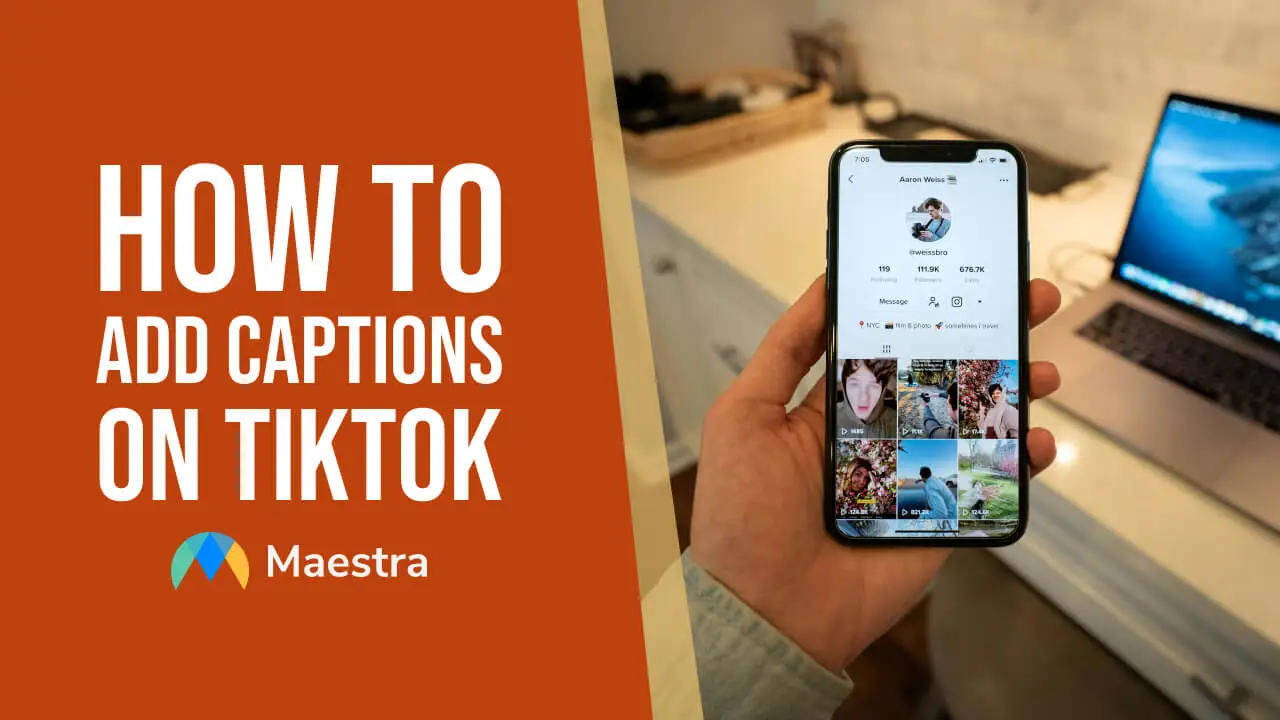100 Great Podcast Ideas for Students in 2025

Podcasts are generally linked with people over 30, but they can be a source of creation and inspiration for students as well. Being a podcaster holds so many opportunities: Students can develop their communication skills, build a personal brand, connect with a like-minded audience, and inspect the topics they genuinely care about.
In this blog, we will share 100 podcast ideas for students in different parts of life. Our list consists of 20 tailored ideas for graduate, college, high school, middle school, and primary school students who want to enter the world of podcasts as creators.
Let’s get started.
Podcast Ideas for Graduate Students
The following podcast ideas for students in grad school can help them navigate the ups and downs of academic life. As a podcaster, you can empower your listeners with practical knowledge, whether they’re seeking a PhD or Master’s degree.

- Grad School Hacks: Share actionable tips for a fruitful grad school experience, including strategies for time management, study skills, networking, and so on.
- Thesis Writing Marathon: Walk listeners through the steps of thesis/dissertation writing by providing detailed guidance on planning, structuring, drafting, revising, and defending their work.
- Being an International Grad Student: Put a spotlight on the unique challenges and opportunities for international grad students, such as visa issues, cultural adaptation and more.
- Alumni Journeys: Interview past graduates about their career paths and ask advice for current students.
- The Art of Taking Breaks: Explore how to take healthy and productive breaks during the busy grad school life.
- Mental Health at Grad School: Discuss mental health strategies for grad students, such as stress management, imposter syndrome, seeking professional help, and more.
- Work-Life Balance in Academia: Highlight the importance of balancing academic responsibilities with personal life, including setting boundaries and prioritizing self-care.
- Mastery of Grant Writing: Equip your listeners with the skills to write compelling grant proposals.
- Q&A with the Dean: Interview your dean or program director to hear and share their valuable insights on career development, student life, etc.
- Demystifying Grad School: Talk about and debunk common myths and misconceptions about grad school.
- Support Systems: Seek out ways to connect with peers and mentors, and foster a sense of community with your listeners.
- Teaching Methods: Unpack effective teaching methods for aspiring professors in different areas.
- Financing Your Grad School Journey: Dedicate episodes to financial aids, budget hacks and job opportunities for grad students.
- Research Spotlight: Feature ongoing research projects from various fields and discuss their potential impact with expert guests.
- Conference Tips: Provide advice on how to make most of your academic conferences, including tips on organizing data, public speaking, and more.
- Coping with Rejection: Address how to handle rejection in academia, whether from paper submissions to grant applications.
- Working with Advisors: Offer guidance on how to establish and nurture a positive relationship with academic advisors.
- Ethics in Research: Delve into ethical considerations in academic research such as data integrity, plagiarism, transparency, and more.
- Tech Tools for Grad Students: Review a range of software, apps and digital tools that can boost your listeners’ productivity and streamline their workflow.
- Beyond Academia: Investigate different career paths for graduate degree holders outside of traditional academic roles.
Transcribe Your Podcasts with AI
Podcast Ideas for Students in College
These podcast ideas for students in college cover a broad spectrum of topics, interests and concerns. They focus on different aspects of college life, and aim to mentor students throughout one of the most colorful parts of their lives.
- Study Hacks: Highlight effective study techniques, time management tips, and productivity tools to support college students academically.
- Campus Spotlight: Interview professors, staff, students and interesting characters on campus to draw inspiration from their one-of-a-kind stories.
- The College Bucket List: Share memorable experiences every college student should try before they graduate, including major events, volunteering, spring break destinations and so on.
- Book Club for College Students: Discuss popular books and lesser-known books in various genres to foster a love for reading among your peers.
- The Future of Work: Explore job trends, emerging technologies, and the skills students need to thrive in this evolving landscape.
- Internship Chronicles: Follow students on their internship journeys, emphasizing takeaways for succeeding as an intern.
- Career Q&A: Invite alumni and professionals from different fields to answer student questions and give advice on how to build a successful career.
- College Town Guides: Dedicate episodes to restaurants, activities and hidden gems in your college town, accompanied by interviews with locals.
- Personal Finance Management: Equip students with budgeting, saving, and debt management strategies for navigating college finances.
- Entrepreneurship in College: Walk listeners through the steps of starting a business in college, covering ideating, funding, overcoming challenges and more.
- Personal Branding: Help listeners develop their authentic skills and experience into a compelling personal brand for future career endeavors.
- Social Impact and Activism: Empower other students to get involved in social justice issues, and drive meaningful change on and off campus.
- Dorm Room Detox: Offer tips and tricks for creating a healthy, organized, and functional living space in a dorm.
- Campus Stand-Up: Showcase the comedic talents of students on campus for some laughter and lighthearted entertainment.
- College Sports: Enter the vibrant world of college sports, including athlete interviews, game analyses, behind-the-scenes stories and more.
- Being an International College Student: Delve into the benefits and challenges of studying abroad, along with practical advice and uplifting stories.
- College Cooking 101: Feature quick, affordable and delicious recipes for dorm room kitchens or student budgets.
- Artificial Intelligence in College Education: Investigate how AI is impacting the college learning experience, including its role in personalized learning, content generation, data analysis and more.
- Diversity and Inclusion on Campus: Have open conversations with guests on creating a welcoming and inclusive atmosphere for all students on campus.
- Student Wellbeing: Address mental health, stress management, nutrition and self-care strategies specifically relevant to college students.

Tip: Write a catchy podcast description to draw listeners in and give them a clear idea of what your podcast is about.
Podcast Ideas for High School Students
From academics to extracurricular activities and friendships, high school is a whirlwind of experiences. These podcast ideas for students in high school can inspire you to share your outlook on the world and use your voice to inform, entertain, and connect with others.
- Club Chronicles: Interview school club leaders about their activities and how to get involved.
- Student Spotlight: Feature a different student each episode, highlighting their achievements, hobbies, and unique interests.
- College Countdown: Invite experts to share their guidance on college applications, financial aid, essay writing, and more.
- Mental Health Awareness: Emphasize the importance of teen mental healthand discuss strategies for managing stress, anxiety, etc.
- Pop Culture Games: Play fun games related to pop culture, movies, or music.
- Teacher Takeover: Let a teacher takeover one of your episodes to share their favorite teaching moments and personal stories.
- The Yearbook Diaries: Take a behind-the-scenes look at creating the school yearbook.
- Game On!: Review new video games or board games, and have chats about the current state of the gaming industry.
- Unsolved School Problems: Look for and brainstorm solutions to common problems faced by high school students, such as peer pressure, lack of motivation, and so on.
- Unsung Heroes: Interview or profile people who make a difference in your school or community but don’t get much recognition.
- Beyond the Textbook: Explore real-world applications of different subjects taught in high school.
- Second-Hand Stories: Focus on the benefits of thrifting, vintage clothing, or upcycling projects for a more sustainable future.
- The Art of Independence: Discuss tips for developing healthy relationships, managing personal finances, and becoming more independent.
- Wellness in High School: Delve into various wellness practices like yoga, meditation, and healthy eating habits.
- STEM Stars: Showcase innovative projects and research by students in science, technology, engineering, and mathematics.
- Future Forward: Investigate emerging careers, new technologies, and future trends that high school students should be aware of.
- Athlete Chats: Talk to student-athletes about balancing sports and academics, their training routines, and team dynamics.
- Alumni Advice: Interview alumni on their past high-school experiences, including college, career management, and life lessons.
- Creative Corner: Provide a platform to students who engage in various forms of artistic expression, such as writing, drawing, music, and drama.
- Green Heroes: Draw attention to environmental issues, sustainability practices, and school initiatives aimed at protecting the planet.

Tip: Create video snippets from the best parts of your podcast, and share them on platforms like Instagram and TikTok to repurpose your content. Don’t forget to add subtitles to your videos for improved accessibility and engagement.
Podcast Ideas for Middle School Students
Middle school is a pivotal time where curiosity is at its peak. Whether it’s discussing scientific mysteries or interviewing book characters, these podcast ideas for students in middle school can ignite a passion for learning beyond the classroom.
- Tech Talks: Discuss internet safety, responsible social media use, and best educational apps for middle school students.
- Ask a Teacher: Dedicate an episode where students submit questions for a specific teacher to answer.
- Weird Science: Explore unusual scientific phenomena, such as black holes, cryptozoology, and so on.
- Drama Club Debrief: Interview students involved in the drama club about their productions and challenges.
- Math Mysteries: Untangle math problems in a fun and engaging way.
- Superheroes Academy: Invite students to solve real-world problems through the lens of their favorite superheroes.
- Podcast Detectives: Try to uncover the mysteries behind famous detective stories, such as Sherlock Holmes, Hercule Poirot, and more.
- School Spirit: Share school events, achievements, and students accomplishments.
- Study Skills 101: Offer practical tips and tricks for effective studying, organization and time management in middle school.
- Test Prep Talk: Ask teachers, experts, and other students to share their strategies for standardized tests.
- Animal Adventures: Discover different animal species, conversation efforts, and people who work with animals.
- Friendship at Middle School: Talk about common friendship conflicts in middle school and provide strategies for healthy resolution.
- School Announcements: Present school announcements with a creative twist, perhaps with dramatization or humor.
- School Service Spotlight: Interview student council members or highlight volunteer opportunities in your school community.
- Future Fiction: Brainstorm and narrate stories set in the future, imagining potential careers, technological advancements, or societal changes.
- Public Speaking Power Up: Share practical tips for overcoming stage fright and delivering successful presentations.
- Middle School Madness: Let listeners submit their biggest frustrations about middle school, and present lighthearted solutions or comedic takes on the situation.
- Teacher Types: Create funny (but respectful) skits or character portrayals of different teacher personalities.
- Study Buddies: Offer advice on forming effective study groups and collaborating with classmates.
- Book Character Interviews: Imagine interviews with characters from popular books, considering their backgrounds and motivations.

Tip: Create a release schedule and stick to it, as consistency is not only important for building a loyal fanbase but also cultivating self-discipline.
Podcast Ideas for Students in Primary School
Yes, primary school students can totally make podcasts with the help and supervision of an adult. The following podcast topics will let their imagination run wild and boost their enthusiasm for learning while having fun.
- School Days: Discuss what makes school fun and interesting, including your field trips, projects and so on.
- Silly Science Experiments: Perform silly science experiments (volcanoes, slime, etc.) at home and explain them in your own words.
- Nature Detectives on Patrol: Go on a nature walk, record interesting sounds, and discuss the plants and animals you encountered.
- Holiday Highlights: Research and share interesting facts about different holidays around the world.
- The “What If” Workshop: Pose silly “what if” questions (e.g. What if pets could talk?) and brainstorm creative answers.
- The Costume Challenge: Describe a character’s costume from a book or movie and challenge listeners to guess the character.
- The Feelings Factory: Delve into different emotions and feelings, emphasizing how to manage them.
- Helping Hands: Interview a school bus driver, lunch lady, or janitor about their work and how they help others.
- Mythical Mashup: Examine classic myths and legends in a fun way with your own interpretations.
- News Report: Report on a real-life event (e.g. planting a class garden) using math concepts like addition and subtraction.
- Time Capsule: Brainstorm and talk about what you would put in a time capsule to represent your current lives for future generations.
- Bookworm Buddies: Recommend your favorite picture books, describing the story and why you love it.
- Spread Kindness: Mention a simple act of kindness you performed and encourage listeners to do the same, creating a kindness chain reaction.
- Interview the Author: Interview a children’s author about their writing process and favorite books.
- Friendship Fun: Talk about what makes a good friend, share friendship stories, and give advice on how to make new friends.
- World Wonders: Interview a friend or family member about a place they’ve visited or a culture they are familiar with.
- Pet Stories: Ask classmates about their pets, their favorite things about them, and responsible pet ownership.
- Guardians of the Earth: Discover ways to be environmentally friendly and take care of the planet.
- Space Cowboys: Imagine yourself as cowboys exploring space, facing problems and finding solutions like an adventurer
- LEGO Worlds: Explore a range of LEGO creations and have a chat with your classmates about their own LEGO worlds.

Tip: Have fun with sound effects like animal noises and superhero themes to bring your episodes to life.
Frequently Asked Questions
How can kids make a podcast?
Kids can make a podcast just like adults. There are countless podcast ideas for students and easy-to-use apps for recording. Adults can help them to find equipment, edit recordings, and then share the podcast. They must also monitor the process to ensure the content is appropriate for the target audience, which is other kids.
Are podcasts safe for kids?
Podcasts can be safe for kids, but as an adult, you must be mindful of certain things. If a kid is going to listen to a podcast, make sure to look for “Kids & Family” categories, read the description, and listen to a bit yourself first. If a kid wants to create a podcast, guide and supervise them throughout the process for appropriate content, privacy, and online safety.
How can I structure an academic podcast?
For academic podcasts, it’s better to consider a basic structure as the topic can be already complex. Adopt a three-act structure (introduction, body, conclusion), or a chronological one, where you explore the historical development of a concept or research area.
What makes a good podcast in education?
A good educational podcast should be well-organized with a clear flow of information. Plus, the host and guests should demonstrate a strong understanding of the topic as well as enthusiasm. The language should be tailored to the target audience, and engaging elements like real-world examples can be utilized to increase engagement.
How to make a good podcast for school?
To make a good podcast for school, focus on topics that resonate with students and educators. Some best podcast ideas for students include discussing study tips, exploring career paths, or sharing inspiring stories. Meanwhile, for educators, podcasts can focus on innovative teaching methods or discussions on current developments in education.
How can podcasts be used in the classroom?
In the classroom, teachers can use podcasts to explain complex topics in a relatable format. They can also assign podcast episodes as homework or utilize them to cater to auditory learners. Furthermore, students can create their own podcasts to develop skills in research, collaboration, and storytelling.
Summary
In this blog, we listed 100 podcast ideas for students, which is divided into five sections regarding graduate, college, high school, middle school, and primary school students. These ideas can be the initial step both for students who are interested in creating their own podcast, or teachers who want to make a podcast with their students.
During this process, always remember to:
- Choose a subject you sincerely care about and share your passion with others.
- Provide actionable tips for your listeners so they can adapt what they’ve learned from your podcast to their daily lives.
- Invite and interview expert guests to give the most accurate information.
And simply enjoy the ride!



